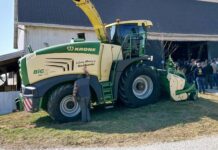WASHINGTON — The U.S. Department of Agriculture’s Animal and Plant Health Inspection Service announced a final rule Nov. 1 that will complete efforts to modernize import regulations for bovine spongiform encephalopathy (BSE).
The BSE regulations are based on internationally accepted scientific literature and standards set by the World Organization for Animal Health (OIE).
The final regulation will allow for the trade of bovines and bovine products, while still protecting the United States from the introduction of BSE.
“This action will bring our BSE import regulations in line with international standards, which call for countries to base their trade policies on the actual risk of animals or products harboring the disease,” said Dr. John Clifford, APHIS deputy administrator and chief veterinary officer.
When this rule takes effect, APHIS will use the same criteria and categories that the World Organization for Animal Health uses to identify a country’s BSE risk status. APHIS will base its import policy for a particular country on that country’s risk classification as determined by OIE’s risk evaluation.
The rule also allows APHIS to conduct its own assessment when deemed necessary, such as when a country is not yet classified by the OIE.
This regulation does not change other measures currently in place in the United States, such as the FDA’s ruminant-to-ruminant feed ban.
This rule will be published in the Federal Register and will become effective 90 days after publication.









